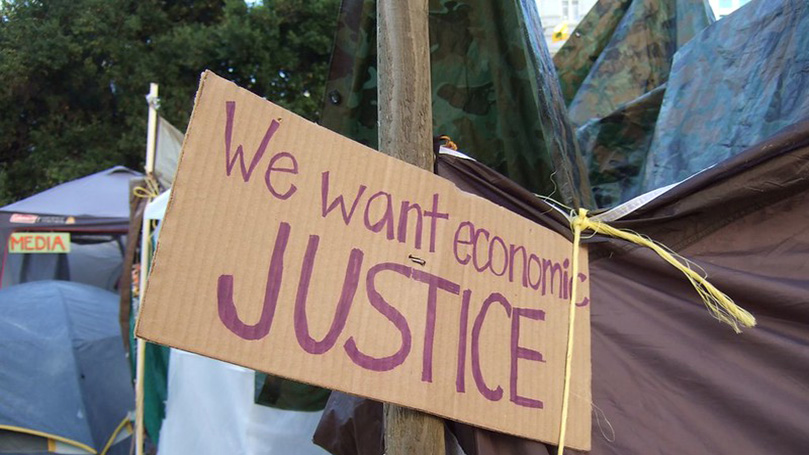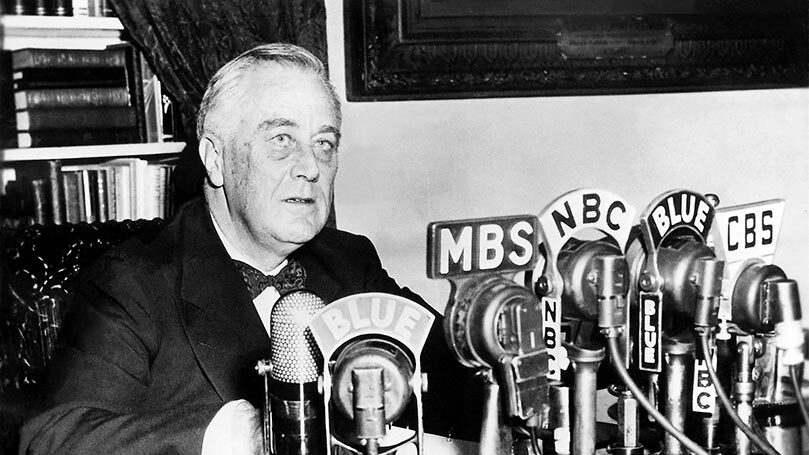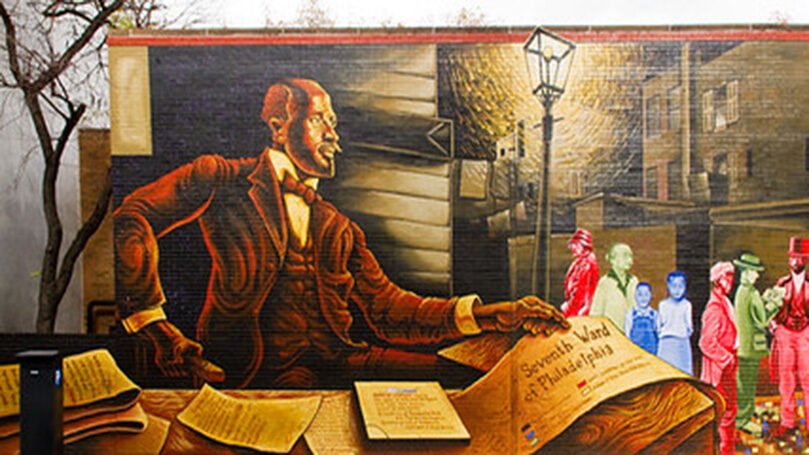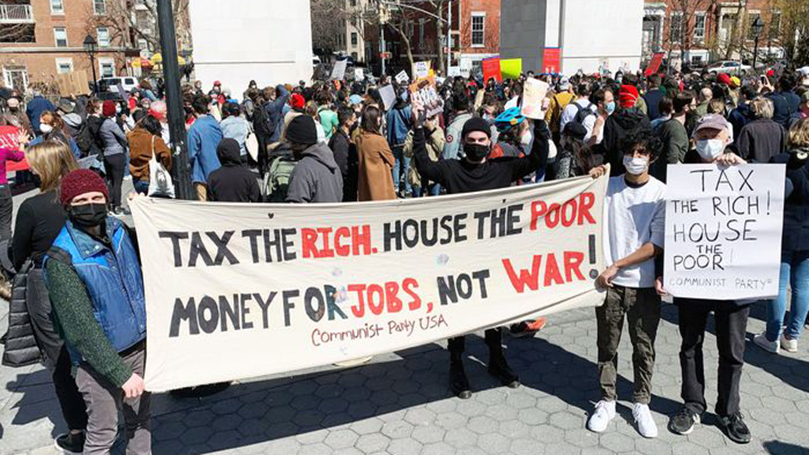
Every form of scientific socialism has adapted to the unique circumstances and material conditions of the country it has been in. In the USSR there was the soviet system, in China there is Mao Zedong thought and socialism with Chinese characteristics, in the Vietnam there is Đổi Mới (innovate or renovate), the name given to economic reforms, and so on. Likewise, in the current-day United States there will be a form of socialism that will be adapted to its material conditions.
The Communist Party USA (CPUSA) envisions this unique approach to socialism in the US as what it calls Bill of Rights Socialism. There have been excellent works on this, such as this piece by Roberta Wood and Dee Miles and this piece by Brad Crowder, and here I would like to start an investigation and development of the idea as well. My goal isn’t to explore the subject too deeply on a philosophical or theoretical level, but to propose what a socialist-oriented economic Bill of Rights might look like — not necessarily Bill of Rights Socialism in its entirety — and express it on a level that could be used as an accessible, appealing mass political platform.
Crafting an Economic Bill of Rights
One of the core ideological foundations of U.S. culture and political consciousness is that of freedom, particularly those such as free speech, freedom of assembly, and others enshrined in the Bill of Rights. The Bill of Rights and the ideas within it play a major role in American political discourse generally, and in the minds of many Americans they are the very foundations that allow for political discourse.
What I propose here is an “economic” Bill of Rights. In doing so, I draw from three sources in particular: Franklin D. Roosevelt’s Second Bill of Rights, W. E. B. Du Bois’ application for membership in the Communist Party, and the CPUSA’s current Party Program.

The popular idea of an economic Bill of Rights traces back to Franklin D. Roosevelt’s “Second Bill of Rights,” if not further. In his State of the Union Address in 1944, he recommended a second Bill of Rights, saying the following:
This republic had its beginning, and grew to its present strength, under the protection of certain inalienable political rights — among them the right of free speech, free press, free worship, trial by jury, freedom from unreasonable searches and seizures. They were our rights to life and liberty.
We have come to a clear realization of the fact, however, that true individual freedom cannot exist without economic security and independence. “Necessitous men are not free men.” People who are hungry, people who are out of a job are the stuff of which dictatorships are made.
In our day these economic truths have become accepted as self-evident. We have accepted, so to speak, a second Bill of Rights under which a new basis of security and prosperity can be established for all — regardless of station, or race or creed.
Among these are:
-
- The right to a useful and remunerative job in the industries, or shops or farms or mines of the nation;
- The right to earn enough to provide adequate food and clothing and recreation;
- The right of farmers to raise and sell their products at a return which will give them and their families a decent living;
- The right of every business man, large and small, to trade in an atmosphere of freedom from unfair competition and domination by monopolies at home or abroad;
- The right of every family to a decent home;
- The right to adequate medical care and the opportunity to achieve and enjoy good health;
- The right to adequate protection from the economic fears of old age, and sickness, and accident and unemployment;
- And finally, the right to a good education.
All of these rights spell security. And after this war is won we must be prepared to move forward, in the implementation of these rights, to new goals of human happiness and well-being.
America’s own rightful place in the world depends in large part upon how fully these and similar rights have been carried into practice for all our citizens. For unless there is security here at home there cannot be lasting peace in the world.
It’s unfortunate that we’ve yet to make good on any of these ideas, and many even seem beyond the scope of contemporary American political discourse. Nonetheless, drawing from this source not only grounds us in existing American politics and history but also provides a good list of demands that are still applicable today. While FDR wasn’t a socialist, the rights listed in his Second Bill of Rights would arguably go a long way in freeing many Americans up from various hardships and allow for increased political activity and potentially involvement in the socialist movement.

From there, we then look to Du Bois’ application for membership in the Communist Party, written in 1961. In it, he discusses what the Communist Party would call for to make the United States truly democratic. He says:
The path of the American Communist Party is clear: It will provide the United States with a real third party and thus restore democracy to this land. It will call for:
-
- Public ownership of natural resources and of all capital.
- Public control of transportation and communications.
- Abolition of poverty and limitation of personal income.
- No exploitation of labor.
- Social medicine, with hospitalization and care for the old.
- Free education for all.
- Training for jobs and jobs for all.
- Discipline for growth and reform.
- Freedom under law.
- No dogmatic religion.
These aims are not crimes. They are practiced increasingly over the world. No nation can call itself free which does not allow its citizens to work for these ends.
While Du Bois’ list is more explicitly socialist, we see similarities with FDR’s Second Bill of Rights as well as in some of the popular demands of today. Du Bois’ list goes beyond reforms that a capitalist government might make (whether or not they actually uphold them) and actually demands the nationalization of natural resources and capital as well as the call for the end of exploitation of labor. Some of the demands, however, are more political than economic, and the goal at the moment is to craft a Bill of Rights specifically targeting economic issues.

Finally, we come to CPUSA’s current Party Program. In it we find the following:
The anti-monopoly people’s coalition will put forward a program of public policies and government practices as the coalition grows and strengthens. A developed anti-monopoly program will build on the many struggles and issues already begun and won in the fight against the extreme right. As part of that coalition, the Communist Party will propose radical democratic demands aimed at curbing the political, economic, and ideological power of the monopolies. Unless they are already won at an earlier stage, our demands will include
-
- The building of a mass people’s party capable of contending for governmental power, a party free of domination by any monopoly interests.
- Removal from the electoral system of the financial contributions of monopolies, to be replaced by public funding and guarantees of honest elections where each vote counts and all votes are counted.
- Full restoration and expansion of the Bill of Rights and all democratic rights; the complete separation of church and state.
- Full legal protection from hate crimes and racial profiling, the institution of police accountability by civilians, an end to police violence, and the outlawing of oral and written racist propaganda.
- No discrimination in the workplace on the basis of race, gender, nationality, or disability and against other protected groups. Employers must provide equal pay for equal work. Employers must prove performance-based non-discrimination.
- Implementation of affirmative action and compensatory programs to achieve actual equality for the racially and nationally oppressed and women.
- Prevention of the “freedom” of monopolies to move assets in ways that harm workers and communities without full compensation; the guaranteed right to a job at living wages through public works and public service jobs or full income; the growth of public ownership of industries; nationalization of “too big to fail” banks.
- The right to form and join a union free from interference or retaliation; guarantees that corporations must fulfil their contractual obligations of providing pensions and other benefits.
- Full funding for public education, affordable housing programs, day care, Social Security, and a universal health care program, youth job training and recreational and cultural programs.
- Accelerating the transition to a green, carbonless economy, as part of a massive public works jobs program
- Creation of a social fund to make up for past and continuing wrongs and to help achieve equality in facilities and infrastructure for communities of the racially and nationally oppressed and women.
- No taxes for low-income people; progressive taxation of the wealthy, for-profit corporations, and taxation on financial transactions such as purchases and sales of stocks, bonds, derivatives, and other investment instruments.
- Replacement of the imperialist foreign policy of preemptive strikes and dictating to the world in the interests of U.S.-based transnationals by a policy of international cooperation to solve problems of war and aggression, poverty, education, environment, health, and development.
- Military budget slashed to a fraction of current spending with funding transferred to social programs.
- All media to be free of monopoly corporate ownership.
Later on in the Party Program, we see an explicit outlining of what a Socialist Bill of Rights might look like:
Our vision is of a humane socialist USA, which can be achieved in part by enshrining more freedom and democracy in a Socialist Bill of Rights:
-
- Where working people run the country on behalf of the needs of all, where people, peace, and planet come before profits;
- Where all can participate, no matter their religion, race, or nationality;
- Where immigrants have the same human rights as the native born;
- Where the strength of our multinational, multiracial, multigenerational, gender-diverse working class can solve the problems we face in the interests of all people;
- Where creating a sustainable, demilitarized economy takes priority over profits;
- Where the supposed “right” of companies to pollute is outlawed;
- Where working people are guaranteed union rights;
- Where women have full rights and actual guaranteed equality;
- Where all ethnic, national, gender, and racial groups have full guaranteed equality and civil rights, implemented through an immediate and urgent program of compensatory measures;
- Where fully funded quality education from pre-school to university is the highest priority;
- Where fully funded universal health care for all is a right;
- Where a job and a superior standard of living are a right.
Here, between the political and economic demands, we see common themes once again. Spread out over the course of almost 80 years, we see certain economic demands arise over and over. Though each time these demands have been iterated slightly differently, they’ve all been simple and easy to understand. Going back to the 1940s with FDR’s Second Bill of Rights up through to Du Bois’ list of demands and then to the current CPUSA Party Program, we can see the need for a succinct yet comprehensive economic Bill of Rights, something that might be the foundation for making Bill of Rights Socialism a widespread, powerful movement in American politics.

What an economic Bill of Rights might look like
Between these three sources we have quite a number of potential rights and policy proposals that could constitute an economic or socialist Bill of Rights, but part of the appeal of the existing Bill of Rights is that it captures American political values in just 10 amendments. The number 10 is a round, satisfying number and has also been used to outline other key principles, such as the Ten Commandments and the Black Panther Party’s Ten-Point Program. A short, succinct list can act as a rallying cry and can be remembered and repeated by its proponents.
While there are so many things that need to be addressed, we want to create something that even those less interested in politics can hear and agree with without having to remember an extensive platform. Drawing from the three aforementioned sources and adapting them to modern times to some degree, I recommend the following 10 amendments (or some variation of them):
- The right to a useful, well-paying, and meaningful job, complete with the right of free association in such a job, shall be guaranteed to every United States resident.
- The right to adequate housing, food, clothing, and recreation, the necessities of life, shall be guaranteed to every United States resident.
- The right to equal pay for equal work regardless of sex, race, religion, national origin, gender identity, sexual orientation, disability, age, or legal status shall be guaranteed to all United State residents. In concordance with this, the phrase “except as punishment for crime whereof the party shall have been duly convicted” shall be removed from the text of the 13th Amendment.
- The right of every resident of the United States to work and do business in an atmosphere free from unfair competition, domination by monopolies, and unfair financial practices shall be guaranteed.
- The right of every resident of the United States to the enjoyment of the natural resources within the territory of the United States and its various States, and any revenue thereof, shall be guaranteed. The territory of any federally or state-recognized Native American tribe or nation, unless otherwise agreed upon by the government of the tribe or nation, shall be exempt from this provision. All land protected under past treaties with a Native American tribe or nation and the guarantees within, whether made by the United States or one of its States, shall be recognized as specified in the given treaty unless renegotiated with the tribe or nation.
- The right to healthcare and the opportunity to achieve and enjoy good health shall be guaranteed to all United States residents.
- The right to adequate protection from the economic fears of old age, sickness, accident, and unemployment shall be guaranteed to all United States residents.
- The right to a good education, at all levels, shall be guaranteed to every resident of the United States.
- The right to modern and efficient communications and transportation shall be guaranteed to every United States resident.
- The right of communities both at home and abroad to reparations for the actions and policies of the United States both present and past, and a fair, formal process by which such claims can be brought against the United States.
Each of these would be followed by a clause similar to those found in a number of other amendments giving Congress the authority to enforce the amendments through legislation, such as, “The Congress shall have the power and duty to enforce this article by appropriate legislation.” The wording of each would have to be honed by specialists, and it’s likely that certain changes and compromises might be made, but my hope is that this can be a starting point.
If we were to whittle the economic Bill of Rights down to slogans, we might see something like:
- The right to a good job and the right to unionize.
- The right to the necessities of life.
- The right to equal pay for equal work and full abolition of slavery.
- The right to be free from unfair business and financial practices and monopolies.
- The nationalization of natural resources and Indigenous peoples’ right to their land.
- The right to healthcare.
- The right to retirement.
- The right to a good education.
- The right to modern communications and transportation.
- The right to reparations.
This economic Bill of Rights not only provides all Americans with key economic rights but has the potential to unite wider popular forces, oppressed groups, and potential allies within the country under a common cause. The economic Bill of Rights isn’t socialism, nor will it inherently bring about socialism just through its passage, but the goal of this new Bill of Rights is to create a general platform that will benefit the masses and further enable a more thorough socialist revolution. In the struggle for such a Bill of Rights, we would have to create extensive alliances, work within our communities to create bodies of political engagement, and lay the groundwork for a more democratic system capable of defeating capitalism independent from existing political institutions.
Furthermore, if the passage of such an economic Bill of Rights were successful, the government would be legally bound to enforce it lest they openly delegitimize themselves. To fulfil their duty in upholding the newly amended Constitution, the government would have to move left, opening up new avenues for class struggle and the fight for political and economic democracy. There very likely would be a reactionary push by the ruling class to revoke these new rights and maintain their heavy-handed dominance over American society, but the people would be unlikely to accept such an attempt without fighting back.
Of course, just an economic Bill of Rights would still leave much to be desired, given the various other issues and forms of oppression seen in American society. We would likewise need a social or civil rights Bill of Rights to address these issues. As seen in both Du Bois’ application and the CPUSA Party Program, there are certain democratic and social guarantees beyond the economic that are needed to make the country truly free.
Bill of Rights Socialism and a socialist-oriented economic Bill of Rights wouldn’t just be static “things” — they would be ever-evolving processes. Only in a socialist society can any rights in an economic Bill of Rights be completely fulfilled, and the same goes for many of the values espoused in our current Bill of Rights. Socialism is the only path to the freedom that the United States claims to strive for, and it’s what we must fight for if we truly want to be free.
Original article was first posted on June 9, 2021, in M. P. Britt’s blog
Images: Top, Earthworm (CC BY-NC-SA 2.0); President Roosevelt giving State of the Union Speech where he outlines a “Second Bill of Rights,” Jan. 11, 1944 (public domain); Mural of W. E. B. Du Bois, Erik Anestad (CC BY 2.0); CPUSA banner; People before Profits banner, Backbone Campaign (CC BY-NC-SA 2.0).


 Join Now
Join Now